By Sherif Awad
Back in 2004, I was asked as a staff writer at Carnival Arabia, a monthly entertainment magazine then published by IBA (Egypt Today’s parent company), to interview Nour El-Sherif, whose Ramadan TV series was set to air the following month. Quite by coincidence, Showtime Networks in Dubai was expanding its target audience that same year to reach out to more spectators interested in Arab content and approached me to do a Q&A with Nour El-Sherif who was shooting at a remote Haram villa his Ramadan TV series
Eish Ayamak (Live the Day.) With the TV crew in tow, a photographer and I went to the villa and waited for El-Sherif to finish a scene in which he was wearing pajamas at home. After the director wrapped up filming, El-Sherif welcomed us with a smile before politely excusing himself to change into a suit for our interview, for which we used the set of the series as a backdrop.
[caption id="attachment_302794" align="alignnone" width="518"]
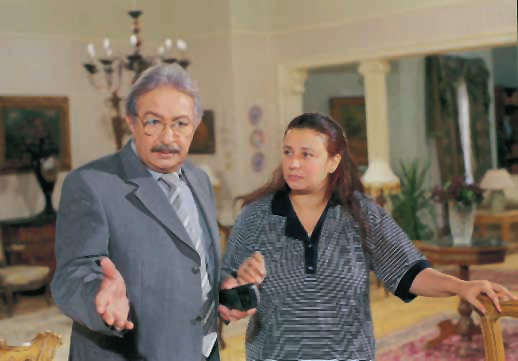
El-Sherif with Abla Kamel in Eeish Ayamak (Live the Day)[/caption]
El-Sherif was known to be a very cultivated actor and, in fact, he was. For every question we asked, we got a sophisticated and in-depth answer. At the end, we asked El-Sherif to make promos for his interview and for the series that would be shown exclusively on Showtime. I remember we kept asking him to repeat the promos with different words from different camera angles. “Watch me on Showtime this Ramadan,
Eish Ayamak, Nour El-Sherif,” he said to the camera over and over again, never tiring. As a great professional, El-Sherif untiringly took directions from the young TV director, a smile on his face. I was struck by the way the cinema icon never once complained or withdrew like many of today’s actors who do not appreciate the media that helped them become stars.
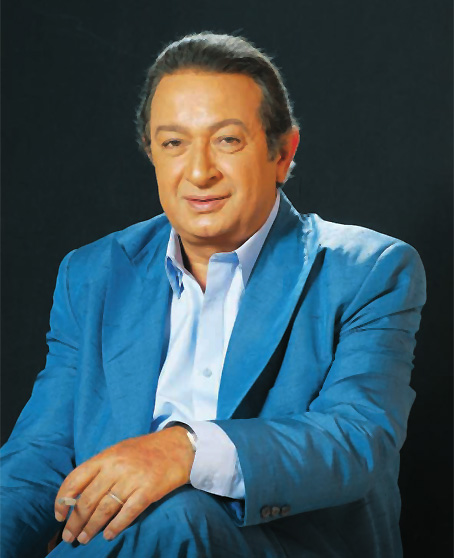
El-Sherif’s passing last month brought back memories of those moments the TV crew and I shared with the star on set. I’ll never forget the way he treated us like younger brothers and sisters as the interview progressed. Stars like Nour El-Sherif never die. Audiences will forever “relive his days” through his unforgettable roles in cinema, television and on stage.
To commemorate El-Sherif’s death, Egypt Today revisits Awad’s 2004 interview. Edited excerpts:
The Samanoudi Studios feel like a long way from the noisy, crowded streets of Cairo. This is where Nour El-Sherif, whose resumé boasts 167 films, 17 plays and more than 20 TV series, is filming what most people will be watching this Ramadan. He is one of the few Arab actors whose work reaches the entire Arab world. And Ramadan is his time.
Eish Ayamak (Live the Day) sees El-Sherif’s character right in the heart of a midlife crisis. “This period is a critical period in the relationship of a man and a woman, and has effects on their kids,” El-Sherif says, describing the theme of the series. He feels that, for many Egyptians, the problems that arise during this period are left unsolved, and if people do not know how to deal with them, can destabilize any marriage. Written by Mustafa Moharram and directed by Mohamed El-Nokari,
Eish Ayamak features Abla Kamel as El-Sherif’s wife, along with Yasmine El-Gelani, Iman Ayoub and Wessam Hamdy as their children. The 58-year-old actor is coming off a good run, having recently received a life-time achievement award from the Egyptian Writers and Critics Association at last month’s Alexandria International Film Festival. “Being recognized by the Alexandria Festival made me very happy because I have been involved in the festival since its beginning,” he says.
[caption id="attachment_302797" align="alignnone" width="851"]
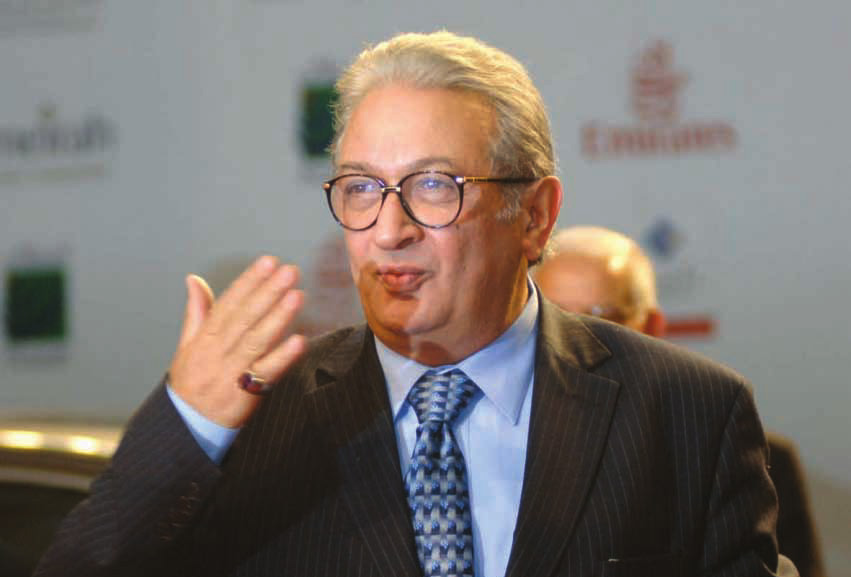
At the Dubai International Film Festival in 2005[/caption]
Praise from his peers is never in short supply, but El-Sherif himself credits working with the greats as being a huge part of his own education. His television debut was in director Mohammed Fadel’s 1967 series
El-Qahera Wel Nass (Cairo and the People). His big screen debut came the same year in the movie adaptation of Naguib Mahfouz’s
Qasr El-Shouq (Palace of Desire), where he worked alongside a plethora of stars. “This was a dream to work in front of Yehia Shahine, Nadia Lotf, Abd El-Moneim Ibrahim and others,” he says, but adds that when he re-watched the film recently, he felt that he was overacting. El-Sherif puts this early mistake down to his background in theater and the more flamboyant approach that medium requires in contrast to the less-is-more method that screen actors use.
[caption id="attachment_302796" align="alignnone" width="470"]
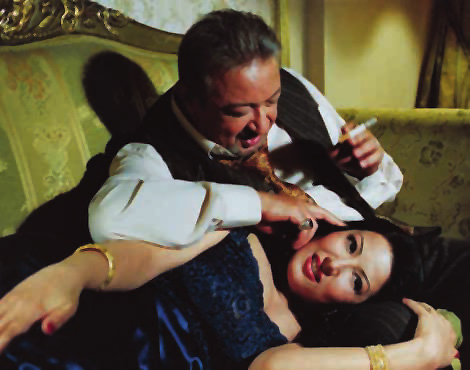
In Omaret Yacoubian (The Yacoubian Building)[/caption]
But attention to detail has always been his mark. “Nour reads the whole script, not just his role; he studies it hard. He is an actor that adds to the character,” says Ahmed Saleh, El-Akhbar newspaper film critic and screenwriter of
El-Shaytan Ya’ez (The Devil Preaches) and
El-Hokm Akher El-Galsa (The Verdict will Be Announced at the End of the Session), both starring El-Sherif.
(Read the full article in the September issue)
[caption id="attachment_302800" align="alignnone" width="499"]
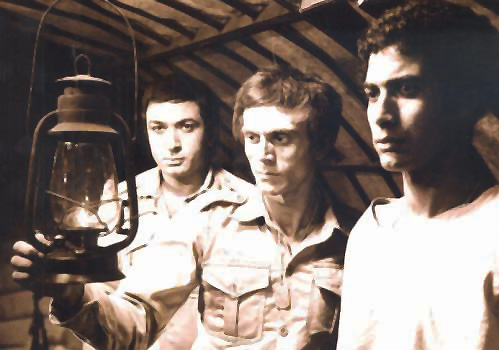
El--Sherif (left) in Abnaa El-Samt (Sons of Silence)[/caption]
[caption id="attachment_302798" align="alignnone" width="371"]
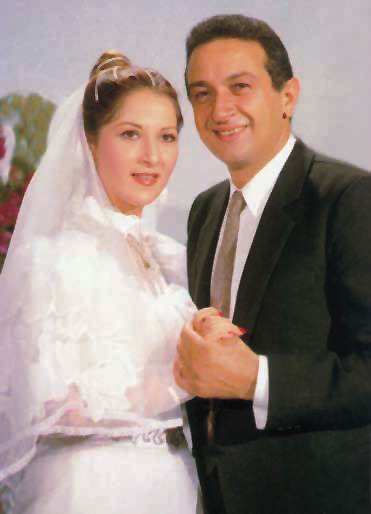
El-Sherif and real-life wife Poussy appeared in many films together[/caption]
[caption id="attachment_302799" align="alignnone" width="719"]
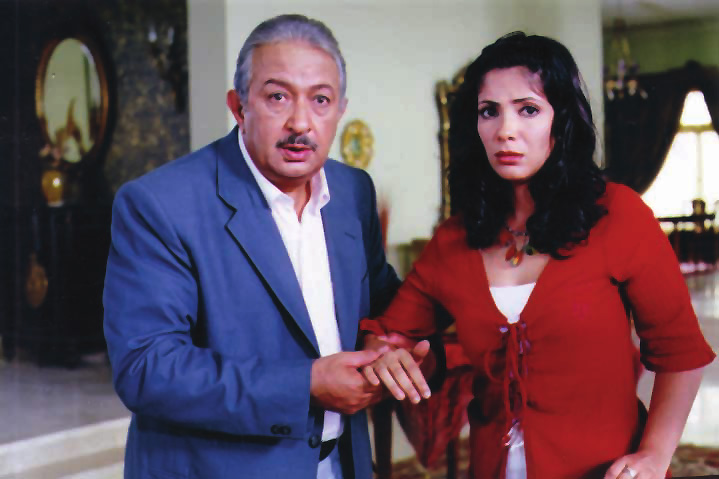
With Mona Zaki in Dam El-Ghazal (Gazelle Blood)[/caption]
[caption id="attachment_302795" align="alignnone" width="397"]
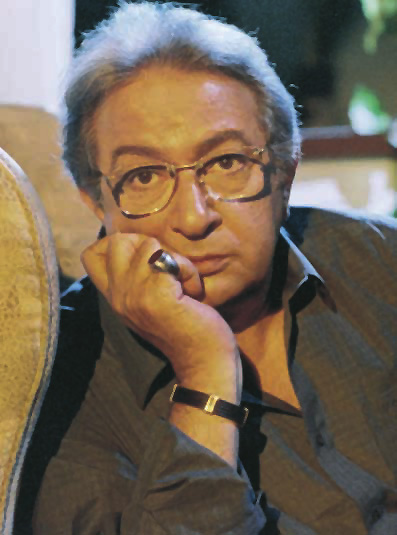
In El-Ragol El-Akkar (The Other Man)[/caption]
 El-Sherif with Abla Kamel in Eeish Ayamak (Live the Day)[/caption]
El-Sherif was known to be a very cultivated actor and, in fact, he was. For every question we asked, we got a sophisticated and in-depth answer. At the end, we asked El-Sherif to make promos for his interview and for the series that would be shown exclusively on Showtime. I remember we kept asking him to repeat the promos with different words from different camera angles. “Watch me on Showtime this Ramadan, Eish Ayamak, Nour El-Sherif,” he said to the camera over and over again, never tiring. As a great professional, El-Sherif untiringly took directions from the young TV director, a smile on his face. I was struck by the way the cinema icon never once complained or withdrew like many of today’s actors who do not appreciate the media that helped them become stars.
El-Sherif with Abla Kamel in Eeish Ayamak (Live the Day)[/caption]
El-Sherif was known to be a very cultivated actor and, in fact, he was. For every question we asked, we got a sophisticated and in-depth answer. At the end, we asked El-Sherif to make promos for his interview and for the series that would be shown exclusively on Showtime. I remember we kept asking him to repeat the promos with different words from different camera angles. “Watch me on Showtime this Ramadan, Eish Ayamak, Nour El-Sherif,” he said to the camera over and over again, never tiring. As a great professional, El-Sherif untiringly took directions from the young TV director, a smile on his face. I was struck by the way the cinema icon never once complained or withdrew like many of today’s actors who do not appreciate the media that helped them become stars.
 El-Sherif’s passing last month brought back memories of those moments the TV crew and I shared with the star on set. I’ll never forget the way he treated us like younger brothers and sisters as the interview progressed. Stars like Nour El-Sherif never die. Audiences will forever “relive his days” through his unforgettable roles in cinema, television and on stage.
To commemorate El-Sherif’s death, Egypt Today revisits Awad’s 2004 interview. Edited excerpts:
The Samanoudi Studios feel like a long way from the noisy, crowded streets of Cairo. This is where Nour El-Sherif, whose resumé boasts 167 films, 17 plays and more than 20 TV series, is filming what most people will be watching this Ramadan. He is one of the few Arab actors whose work reaches the entire Arab world. And Ramadan is his time. Eish Ayamak (Live the Day) sees El-Sherif’s character right in the heart of a midlife crisis. “This period is a critical period in the relationship of a man and a woman, and has effects on their kids,” El-Sherif says, describing the theme of the series. He feels that, for many Egyptians, the problems that arise during this period are left unsolved, and if people do not know how to deal with them, can destabilize any marriage. Written by Mustafa Moharram and directed by Mohamed El-Nokari, Eish Ayamak features Abla Kamel as El-Sherif’s wife, along with Yasmine El-Gelani, Iman Ayoub and Wessam Hamdy as their children. The 58-year-old actor is coming off a good run, having recently received a life-time achievement award from the Egyptian Writers and Critics Association at last month’s Alexandria International Film Festival. “Being recognized by the Alexandria Festival made me very happy because I have been involved in the festival since its beginning,” he says.
[caption id="attachment_302797" align="alignnone" width="851"]
El-Sherif’s passing last month brought back memories of those moments the TV crew and I shared with the star on set. I’ll never forget the way he treated us like younger brothers and sisters as the interview progressed. Stars like Nour El-Sherif never die. Audiences will forever “relive his days” through his unforgettable roles in cinema, television and on stage.
To commemorate El-Sherif’s death, Egypt Today revisits Awad’s 2004 interview. Edited excerpts:
The Samanoudi Studios feel like a long way from the noisy, crowded streets of Cairo. This is where Nour El-Sherif, whose resumé boasts 167 films, 17 plays and more than 20 TV series, is filming what most people will be watching this Ramadan. He is one of the few Arab actors whose work reaches the entire Arab world. And Ramadan is his time. Eish Ayamak (Live the Day) sees El-Sherif’s character right in the heart of a midlife crisis. “This period is a critical period in the relationship of a man and a woman, and has effects on their kids,” El-Sherif says, describing the theme of the series. He feels that, for many Egyptians, the problems that arise during this period are left unsolved, and if people do not know how to deal with them, can destabilize any marriage. Written by Mustafa Moharram and directed by Mohamed El-Nokari, Eish Ayamak features Abla Kamel as El-Sherif’s wife, along with Yasmine El-Gelani, Iman Ayoub and Wessam Hamdy as their children. The 58-year-old actor is coming off a good run, having recently received a life-time achievement award from the Egyptian Writers and Critics Association at last month’s Alexandria International Film Festival. “Being recognized by the Alexandria Festival made me very happy because I have been involved in the festival since its beginning,” he says.
[caption id="attachment_302797" align="alignnone" width="851"] At the Dubai International Film Festival in 2005[/caption]
Praise from his peers is never in short supply, but El-Sherif himself credits working with the greats as being a huge part of his own education. His television debut was in director Mohammed Fadel’s 1967 series El-Qahera Wel Nass (Cairo and the People). His big screen debut came the same year in the movie adaptation of Naguib Mahfouz’s Qasr El-Shouq (Palace of Desire), where he worked alongside a plethora of stars. “This was a dream to work in front of Yehia Shahine, Nadia Lotf, Abd El-Moneim Ibrahim and others,” he says, but adds that when he re-watched the film recently, he felt that he was overacting. El-Sherif puts this early mistake down to his background in theater and the more flamboyant approach that medium requires in contrast to the less-is-more method that screen actors use.
[caption id="attachment_302796" align="alignnone" width="470"]
At the Dubai International Film Festival in 2005[/caption]
Praise from his peers is never in short supply, but El-Sherif himself credits working with the greats as being a huge part of his own education. His television debut was in director Mohammed Fadel’s 1967 series El-Qahera Wel Nass (Cairo and the People). His big screen debut came the same year in the movie adaptation of Naguib Mahfouz’s Qasr El-Shouq (Palace of Desire), where he worked alongside a plethora of stars. “This was a dream to work in front of Yehia Shahine, Nadia Lotf, Abd El-Moneim Ibrahim and others,” he says, but adds that when he re-watched the film recently, he felt that he was overacting. El-Sherif puts this early mistake down to his background in theater and the more flamboyant approach that medium requires in contrast to the less-is-more method that screen actors use.
[caption id="attachment_302796" align="alignnone" width="470"] In Omaret Yacoubian (The Yacoubian Building)[/caption]
But attention to detail has always been his mark. “Nour reads the whole script, not just his role; he studies it hard. He is an actor that adds to the character,” says Ahmed Saleh, El-Akhbar newspaper film critic and screenwriter of El-Shaytan Ya’ez (The Devil Preaches) and El-Hokm Akher El-Galsa (The Verdict will Be Announced at the End of the Session), both starring El-Sherif.
(Read the full article in the September issue)
[caption id="attachment_302800" align="alignnone" width="499"]
In Omaret Yacoubian (The Yacoubian Building)[/caption]
But attention to detail has always been his mark. “Nour reads the whole script, not just his role; he studies it hard. He is an actor that adds to the character,” says Ahmed Saleh, El-Akhbar newspaper film critic and screenwriter of El-Shaytan Ya’ez (The Devil Preaches) and El-Hokm Akher El-Galsa (The Verdict will Be Announced at the End of the Session), both starring El-Sherif.
(Read the full article in the September issue)
[caption id="attachment_302800" align="alignnone" width="499"] El--Sherif (left) in Abnaa El-Samt (Sons of Silence)[/caption]
[caption id="attachment_302798" align="alignnone" width="371"]
El--Sherif (left) in Abnaa El-Samt (Sons of Silence)[/caption]
[caption id="attachment_302798" align="alignnone" width="371"] El-Sherif and real-life wife Poussy appeared in many films together[/caption]
[caption id="attachment_302799" align="alignnone" width="719"]
El-Sherif and real-life wife Poussy appeared in many films together[/caption]
[caption id="attachment_302799" align="alignnone" width="719"] With Mona Zaki in Dam El-Ghazal (Gazelle Blood)[/caption]
[caption id="attachment_302795" align="alignnone" width="397"]
With Mona Zaki in Dam El-Ghazal (Gazelle Blood)[/caption]
[caption id="attachment_302795" align="alignnone" width="397"] In El-Ragol El-Akkar (The Other Man)[/caption]
In El-Ragol El-Akkar (The Other Man)[/caption]
Comments
Leave a Comment